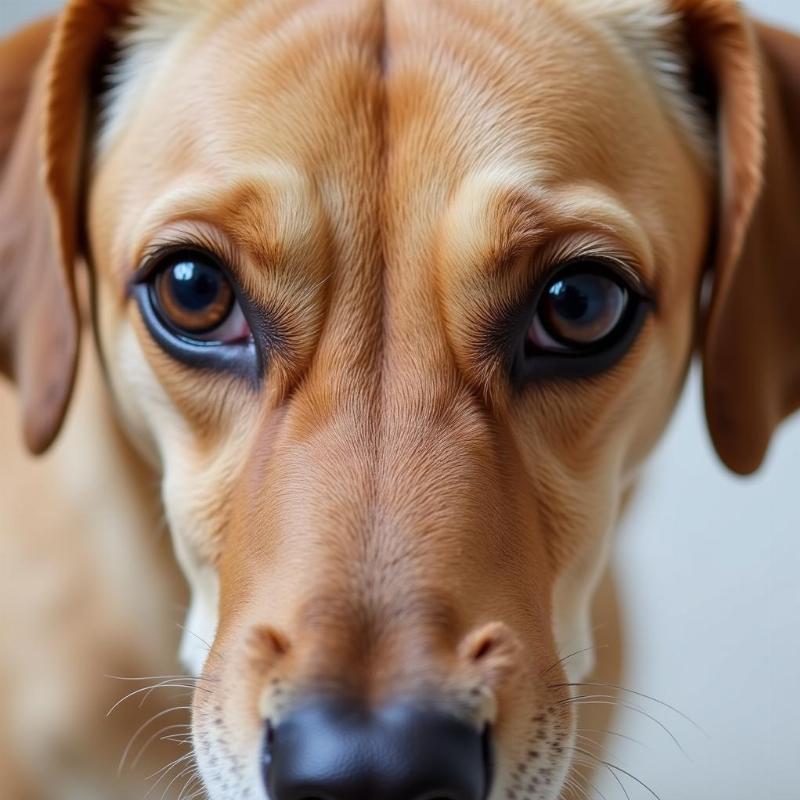Atropine eye drops for dogs are a common ophthalmic medication used by veterinarians for various eye conditions. Understanding their use, benefits, and potential side effects is crucial for responsible pet ownership. This comprehensive guide provides everything you need to know about atropine eye drops for dogs, from administration to potential risks.
Understanding Atropine’s Role in Canine Eye Care
Atropine belongs to a class of drugs called anticholinergics. It works by blocking the action of acetylcholine, a neurotransmitter that controls muscle contractions, including those in the eye. By dilating the pupil (mydriasis) and paralyzing the ciliary muscle (cycloplegia), atropine reduces pain and inflammation associated with certain eye conditions. It also allows veterinarians to perform thorough eye examinations.
Common Uses of Atropine Eye Drops for Dogs
Veterinarians prescribe atropine eye drops for a variety of eye problems in dogs, including:
- Anterior Uveitis: Inflammation of the front part of the eye.
- Corneal Ulcers: Open sores on the cornea.
- Glaucoma (in specific cases): Increased pressure within the eye. Note: Atropine is not typically used for glaucoma and can worsen some types. Its use for glaucoma should only be under strict veterinary guidance.
- Pre- and Post-Operative Care: To dilate the pupil for examination and reduce post-surgical inflammation.
- Diagnostic Purposes: To facilitate eye examinations.
Administering Atropine Eye Drops: A Step-by-Step Guide
Administering eye drops to a dog can be challenging. Follow these steps for safe and effective application:
- Wash your hands: Thoroughly wash your hands with soap and water.
- Restrain your dog: Gently but securely restrain your dog. A second person can be helpful.
- Position the dropper: Hold the dropper just above the eye without touching it.
- Administer the drops: Gently squeeze the prescribed number of drops onto the surface of the eye.
- Close the eye: Briefly close the dog’s eyelid to distribute the medication.
- Reward your dog: Offer a treat and praise.
Potential Side Effects and Precautions
While atropine is generally safe, it can have potential side effects, including:
- Temporary blurred vision: Due to pupil dilation.
- Increased heart rate: In some cases.
- Dry mouth: Less common in topical application.
- Sensitivity to light: Due to dilated pupils.
It’s crucial to consult with your veterinarian if your dog experiences any unusual symptoms.
“Atropine can be a powerful tool in treating eye conditions, but it’s essential to follow your veterinarian’s instructions precisely,” advises Dr. Emily Carter, DVM, a board-certified veterinary ophthalmologist. “Never administer atropine without a proper diagnosis and prescription.”
Monitoring Your Dog After Atropine Administration
Observe your dog closely after administering atropine. If you notice any unusual behavior, such as excessive squinting, redness, or discharge, contact your veterinarian immediately.
 Dog with Healthy Eyes
Dog with Healthy Eyes
Conclusion
Atropine eye drops can be a valuable treatment option for various canine eye conditions. However, responsible pet owners must understand the proper usage, potential side effects, and the importance of following veterinary guidance. By working closely with your veterinarian and following the guidelines outlined in this article, you can ensure the best possible eye care for your beloved companion.
FAQ
-
How long do the effects of atropine eye drops last? The effects can last for several hours to several days, depending on the concentration and individual dog.
-
Can I purchase atropine eye drops over the counter? No, atropine is a prescription medication and requires a veterinarian’s authorization.
-
What should I do if my dog accidentally ingests atropine eye drops? Contact your veterinarian or a pet poison control center immediately.
-
Can atropine eye drops be used for all types of glaucoma? No, atropine can worsen certain types of glaucoma. Only use it under strict veterinary supervision.
-
Are there any alternatives to atropine eye drops? Yes, depending on the condition, other medications may be available. Discuss alternative options with your veterinarian.
-
Can I use expired atropine eye drops? No, never use expired medications.
-
How should I store atropine eye drops? Store as directed on the label, typically in a cool, dark place.
Beautdogs.us is your leading resource for all things dog-related in the US. We offer expert advice on dog breeds, care, and product recommendations for both new and experienced dog owners. From health and nutrition to training and grooming, we’re here to help you navigate the joys and challenges of dog ownership. Contact us for all your dog-related inquiries! Email: [email protected], Phone: +1 501-555-7529. Visit Beautdogs.us for more expert advice and resources.